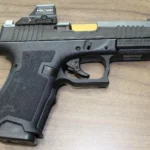Note: Since this article, restoration of firearms rights may be possible for person who has been adjudicated as a mental defective or who has been committed to a mental institution under recent legislation. See Restoration of Firearm Rights After Judicial Commitment blog for details.
Also, since this article, recent legislation has changed to allow possession of antique firearms, as defined by statute, by prohibited persons and allowed for restoration of firearm rights for felons that did not involve violence or drugs. See Changes in Tennessee Laws of Restoration of Rights and Antique Firearms blog for details.
Both under the laws of the United States and the State of Tennessee, there are prohibitions against possessing firearms for certain classes of persons. The following is a brief look at federal and Tennessee laws on the subject. There will be supplemental articles addressing the various issues involved. Unfortunately the laws are complicated and, sometimes, clear answers cannot be given. Any questions on these subjects should be addressed to an attorney who is familiar with firearms laws.
Federal Prohibitions
Under 18 U.S. Code §922(g), certain persons are prohibited from possessing firearms or ammunition (that’s right, a single cartridge can land a person in federal prison). The categories are:
- a person convicted of a crime punishable by imprisonment exceeding one year (but not offenses pertaining to antitrust violations, unfair trade practices, restraints of trade, or other similar offenses relating to the regulation of business practices);
- a person who is a fugitive from justice;
- a person who is an unlawful user of or who is addicted to a controlled substance;
- a person who has been adjudicated as a mental defective or who has been committed to a mental institution;
- an alien who is unlawfully in the United States or who has been admitted to the United States under a nonimmigrant visa;
- a person who has been discharged from the Armed Forces under dishonorable Conditions (note this does not include a “general” discharge);
- a person who, having been a citizen of the United States, renounces his citizenship;
- a person subject to a court order that was issued after a hearing in which the person participated, which order restrains the person from harassing, stalking, or threatening an intimate partner or partner’s child, and which order includes a finding that the person is a credible threat to such partner or partner’s child, or by its terms prohibits the use, attempted use or threatened use of such force against such partner or partner’s child;
- a person who has been convicted of a misdemeanor crime of domestic violence.
The federal statute, 18 U.S. Code §922, has a long list of prohibitions regarding possession and transfers of firearms, of which every gun owner needs to be aware. Crimes involving simple possession by a “prohibited person” carry up to five years in prison under 18 U.S. Code §924, substantially more if the possession involves a firearm used in another crime.
The first issue that must be resolved, what is a “firearm” that may not be possessed by a person one of the prohibited categories? The term “firearm” is a term of art under federal law, as under 18 U.S.C. § 921(a)(3) it means:
- any weapon (including a starter gun) which will or is designed to or may readily be converted to expel a projectile by the action of an explosive;
- the frame or receiver of any such weapon;
- any firearm muffler or firearm silencer; or
- any destructive device. Such term does not include an antique firearm.
What exactly is an “antique firearm”? Those are defined in another section, 18 U.S.C. § 921(a)(16), as:
- any firearm (including any firearm with a matchlock, flintlock, percussion cap, or similar type of ignition system) manufactured in or before 1898; or
- any replica of any firearm described in subparagraph (A) if such replica —
- is not designed or redesigned for using rimfire or conventional centerfire fixed ammunition, or
- uses rimfire or conventional centerfire fixed ammunition which is no longer manufactured in the United States and which is not readily available in the ordinary channels of commercial trade; or
- any muzzle loading rifle, muzzle loading shotgun, or muzzle loading pistol, which is designed to use black powder, or a black powder substitute, and which cannot use fixed ammunition. For purposes of this subparagraph, the term ‘antique firearm’ shall not include any weapon which incorporates a firearm frame or receiver, any firearm which is converted into a muzzle loading weapon, or any muzzle loading weapon, which can be readily converted to fire fixed ammunition by replacing the barrel, bolt, breechblock, or any combination thereof.
The Tennessee Attorney General has issued an opinion that a person convicted of a felony is does not violate state law by possessing a black powder firearm. Opinion No. 08-17.
So, there you have the federal definition of a “firearm” and an “antique firearm”. This will give a taste of how things that seem simple really are not, at least when it comes to what’s legal and what’s not.
Adjudicated as a mental defective or who has been committed to a mental institution
Recently, there have been internet rumors that veterans who have been diagnosed with Post Traumatic Stress Disorder (PTSD) or found to have other disabilities have been barred from owning firearms. Let’s put these rumors to rest right now.
A diagnosis of PTSD, or other mental disorder, without more, does not prevent a person from legally possessing a firearm. Under 18 U.S. Code §922(g)(4), the federal prohibition only applies when someone has been “adjudicated as a mental defective or who has been committed to a mental institution”. Clearly, a diagnosis of a mental disorder is not “an adjudication” or a “commitment”. People who claim otherwise are either misinformed or have their own agenda.
Regulations of the Bureau of Alcohol, Tobacco, Firearms and Explosives (BATFE), define “adjudicated as a mental defective” as (a) a determination by a court, board, commission, or other lawful authority that a person, as a result of marked subnormal intelligence, or mental illness, incompetency, condition, or disease: (1) is a danger to himself or to others; or (2) lacks the mental capacity to contract or manage his own affairs. The term also includes a finding that person is insane or incompetent to stand trial in a criminal case. 27 C.F.R. §478.11
Note that being treated for a mental condition, even at an in-patient facility, is not necessarily the same as being “committed to a mental institution.” A “commitment” requires, in Tennessee at least, action by a court.
There are situations where a federal agency, such as the VA, finds that a person is not capable to manage their funds and appoints a guardian. This has occurred to some veterans who are so impaired that they cannot manage their benefits or agree to appointment of a guardian without fully realizing the implications. In this situation, there may be an “adjudication” that may result in the person being barred from buying or possessing a firearm and ammunition. There may be ways to set aside the adjudication of incompetency.
Tennessee Prohibitions
Tennessee has adopted the federal disqualifications from possessing firearms. T.C.A §39-17-1307(f)(1). However, Tennessee has some interesting twist on its prohibitions. Under T.C.A §39-17-1307(b), a person convicted of a felony involving the use or attempted use of force, violence or a deadly weapon, or a felony drug offense may not possess any firearm. Under T.C.A §39-17-1307(c), no person convicted of anyfelony may possess a handgun.
CAUTION: Even though state law does not prohibit a person convicted of a non-violent felony from possessing a rifle or shotgun, under federal law this would still be a crime, as noted below.
Restoration of Rights
The question often arises after a person has served their sentence or completed probation or parole, how can their rights be restored to possess a firearm? This is a very complicated question and due to recent changes and in state law and federal decisions, it may be impossible in Tennessee.
First, there is a procedure in the U.S. Code for relief of the disabilities under federal law, set out at 18 U.S. Code §925. Under this statute and its administrative regulations, persons convicted of felonies, dishonorable discharged from the military, etc. could petition the Attorney General for relief from the disabilities under 18 U.S. Code §922. Unfortunately, since 1992, Congress has not appropriated any funds for this program. That means, for practical purposes, there is no federal restoration procedure. This leaves, for federal felonies, a presidential pardon to restore the right to possess firearms.
For convictions under state law, many states, including Tennessee, have procedures to restore rights that are affected by felony convictions. Under Tennessee law, there is a procedure under T.C.A. §40-29-101 et seq, for restoration of rights. However, our Supreme Court’s decision in State v. Johnson, 79 S.W.3d 522 (Tenn. 2002), held that since state law affects the right of certain felons to possess a handgun, a restoration of rights does not operate to restore the right to legally to possess a handgun. The decision has far reaching effects on a person with a felony conviction trying to have their right restored to possess a firearm.
A Tennessean with past felony conviction may be thinking, “Okay, so I can’t have a pistol. A rifle or shotgun will do.” The problem is in the case of Caron v. United States, 524 U.S. 308 (1998), the U.S. Supreme Court interpreted federal law to say the restoration of firearm rights must by without limitation. That is, to be effective, the restoration must allow possession of all types of firearms: handguns, rifles and shotguns. This “all or nothing” interpretation of §925 means that a convicted felon who could legally possess shotguns and rifles (but not handguns) under state law, is still prohibited from possessing anyfirearm under federal law.
In 2008, T.C.A §39-17-1307(c) was added to prohibit all felons from possessing handguns Taken together, the Johnson and the Caron cases would indicate that even with a restoration of rights, a person in Tennessee who has been convicted of any felony is prohibited under federal law from possessing allfirearms.
Before 2008, a person convicted of a felony that did not involve drugs, force, violence or a deadly weapon, was not prohibited under state law from possessing a firearm. Such a person could go through the restoration of rights process and regain the ability to possess firearms. However, given the Johnsondecision, the ability of a person convicted of even a non-violent felony to regain his or her firearm rights is very questionable. If a person cannot possess a handgun under state law, he is prohibited from possessing any firearm under federal law.
There may be a way to restore firearm rights for a past felony conviction. Under T.C.A. §39-17-1351(j)(3), non-violent felons who have been pardoned or have had their rights restored, may be eligible for a handgun permit. Since a handgun permit is a defense to the state charge of unlawful handgun possession, this may serve as a complete restoration of civil rights to satisfy the terms of 18 U.S.C. §921(a)(20) and §925. Using this route is uncertain and should be taken only after consultation with a lawyer.
The 2008 law raises questions about whether it applies to convictions for crimes committed before 2008. For instance, is a person was convicted of larceny in 1975 and gone through the restoration process, now barred from possessing a handgun and therefore at risk of a federal prosecution for possessing anyfirearm? There may be constitutional issues involved in applying the change in the law to prior convictions. I would not want to be the test case.
For persons solely convicted of certain non-violent and property crimes, and sentenced to three years or less, relatively recent legislation may provide some relief. The offenses and procedures are set out at T.C.A §40-32-101(g). The person may file a petition for expunction of the records, if the person has no other convictions and at least five years have elapsed since completion of the sentence and paid all costs and restitution. The petition is served on the district attorney general, who may make recommendations. The court is to weigh the interests of the petitioner and the best interests of justice and public safety.
If the petition for expunction is granted, public records of the conviction are destroyed and the person is restored “in the contemplation of the law, to the same status occupied before the arrest, indictment, information, trial and conviction.” Further, the statute specifically provides that a person who is otherwise eligible to possess a firearm is eligible to purchase a firearm and receive a handgun carry permit. T.C.A §40-32-101(g)(14)(B) and (E).
The only other avenue for restoration of rights in Tennessee is exoneration by the governor. T.C.A §40-27-109. This rarely used power authorizes the governor to grant exoneration to a person whom the governor finds did not commit the crime for which the person was convicted. It restores the person to all rights of citizenship.
Conclusion
As you can see, federal and Tennessee law on firearm possession and restoration of rights is a complicated area. In future articles I will attempt to summarize federal and Tennessee laws on purchasing and possessing firearms, as well as the ever changing law on the Tennessee handgun carry permit.
RELATED POSTS:

Frantz, McConnell & Seymour, LLP offers legal services in virtually every area of civil and business law representing clients throughout East Tennessee.




